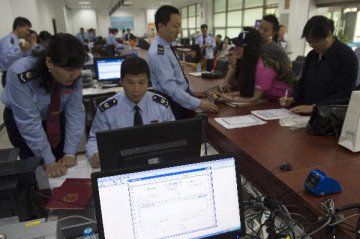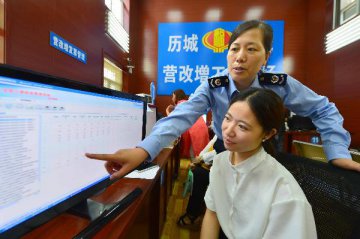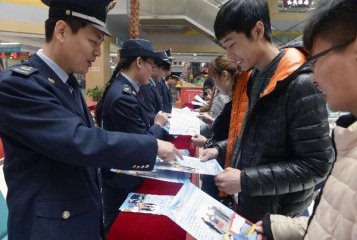
At the eve just before the policy of simplifying and combining value-added tax (VAT) is going to be implemented on next Saturday (July 1), Deng Yong, head of Income Tax Department, and Lin Feng, deputy head of Goods and Services Tax Department of the State Administration of Taxation (SAT), introduced the six policies about tax breaks yesterday.
After the new policy on VAT rate is officially implemented, the VAT rate faced by companies to sell or import 23 kinds of products in fields like agricultural products, natural gas, edible salt and books will be reduced from 13 percent to 11 percent. In addition, the 17 percent tax rate for agricultural product deep processing enterprises to buy agricultural products will be kept unchanged in a bid to avoid tax increase.
Lin indicated that in order to achieve the target of tax neutrality of value-added tax, many countries generally prefer simplified value-added tax system. Streamlining tax rates, reducing preferential and broadening tax base have become the development trend and mainstream of value-added tax system all over the world.
Able to lower resident’s basic living costs
The most direct influence of simplifying tax rates on taxpayers is to lower tax burdens. For example, based on rough estimation, this new policy will benefit 25,000 households of taxpayers in Guangzhou, which are engaged in wholesales and retailing. It is expected to bring a cut of 501 million yuan of tax to taxpayers each year, which will help facilitate enterprises’ motivation to make expansion and further boost economic development.
Relevant industries will directly benefit from the tax breaks. Cao Yingcai, legal representative of Guangzhou Dongxing Agricultural Product and By-product Processing Company, which is specialized in simple processing and wholesales of agricultural products like nut fruits, said to the reporter that “the new policy cancels the 13 percent VAT rate. The 11 percent tax rate will be adopted to the goods which are applicable to the previous 13 percent VAT rate before. The company’s revenue is predicted to reach 15 million yuan in the second half of 2017. Thanks to this policy, substituted money on VAT will reduce by 300,000 yuan when compared with that before the tax rates are adjusted.”
After the tax rates are simplified, the tax breaks will truly make consumers enjoy the benefits. “The tax rate for selling fuel gas will be cut from 13 percent to 11 percent, which can save us about 50 yuan VAT,” Lu Duqiang, financial manager of Guangzhou ENN Fuel Gas Co., Ltd. disclosed.
Xu Xiaoyang, tax and business consulting partner of PricewaterhouseCoopers China, said to the reporter of National Business Daily, that in the long run, there’s potential for bargaining due to decline in tax burden of upstream enterprises, which will help reduce operation costs and enhance economic performance of fuel gas sales companies. On the other hand, the fuel gas sales companies are public fuel gas suppliers and are closely connected with people’s life. The reduction in tax rates can lower costs of residents to buy basic necessities with the help of market and transmission mechanism of price.
Simplify tax rates to create fair environment
Many experts interviewed by the reporter said that simplifying and combining the VAT rate is an inevitable trend.
Lin introduced that before the replacement of business tax with VAT, the tax rates for VAT included 17 percent and 13 percent (excluding zero tax rate, similarly hereinafter) in China. When carrying out pilot of replacing business tax with VAT, the 11 percent and 6 percent tax rates were added based on sales revenues and cost composition of pilot industries and out of the consideration of cutting tax burdens of pilot industries. Hence, there are four kinds of tax rates, making the tax system complicated, which will restrict the function of neutrality of VAT.
Lin added that the value-added tax regime will be simplified by combining four tax rates into three, with the 13 percent tax rate being eliminated and keeping the 17, 11 and 6 percent tax rates. 13 percent tax rate is mainly applicable to agricultural products, books, newspapers and periodicals, magazines and other consumer goods, which are closely related with people’s livelihood; while tax rate for agricultural means of production, such as chemical fertilizer and pesticide, is cancelled and lowered to 11 percent. It shows the country’s tax support for agriculture and people’s livelihood fields.
Xu told the reporter that since the policy of replacing business tax with VAT was fully implemented from May 1, 2016, there are four tax rates except zero tax rate for some specific taxable activities. Various tax rates give full consideration to the differences among different taxable activities, but also bring difficulties for taxpayers to implement it and for taxation authority to collect and manage the taxes.
Xu thought that implementation of the new policy will help further alleviate enterprises’ tax burdens and create the taxation environment which is simple, transparent and fairer.
Tax deduction for agricultural product deep processing enterprises unchanged
The relation between VAT, output tax and input tax forms a deduction chain. Therefore, the new policy caused some enterprises to worry about less deduction of input tax while increase in tax burden.
For instance, a financial administrator of a large food company in Guangzhou said to the reporter that the amount of flour, palm oil and other agricultural products that the company buys is expected to reach 246 million yuan a year. Now the VAT rate on agricultural products is going to be lowered from 13 percent to 11 percent, the company fears that it will cut deduction of input tax but increase tax burden, thus affecting overall economic performance of the company.
On April 28, the Ministry of Finance and the SAT announced that the tax deduction for agricultural product deep processing enterprises to buy agricultural products will keep unchanged based on the 17 percent tax rate so as to avoid the above-said problem.
For example, Zou Xinghong, CFO of Likoufu under Guangzhou Restaurant, said that the company is expected to purchase 3 million yuan of nut products from an agricultural by-product company in the second half of the year. According to the new policy, substituted money on VAT will reach 330,000 yuan if based on the 11 percent tax rate, down by 60,000 yuan. But in terms of tax deduction, Likoufu enjoys a deduction of 390,000 yuan based on the 13 percent tax rate.
The above-mentioned financial administrator remarked that this is equal to another two percentage points of tax subsidy provided by the country. “As for our company, the country offers about 4,915,100 yuan of tax subsidy.”
Translated by Vanessa Chen





















Latest comments